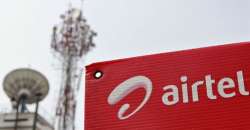Telecom operator Bharti Airtel in its submission to sector regulator Trai has favoured charging incoming calls originating from network of other mobile phone service provider till 2022.
Vodafone Idea and state-owned BSNL have also favoured levying of the interconnect usage charge (IUC), currently 6 paise per minute, on every incoming calls from network of other operators. However, Jio has opposed continuation of the charges.
Trai had proposed to move from the current IUC regime to the BAK (bill and keep), regime where no operator will charge for mobile call transmission, from January 1, 2020. However, the regulator recently floated consultation paper on whether there is a need to defer the date of removing mobile call termination charges.
Airtel and Vodafone Idea have said IUC is a fee charged from a telecom operator for using infrastructure of other service provider to complete call of his subscriber.
"There is a dire need to move the applicable date for BAK (bill and keep) regime by at least 3 years," Airtel said in its submission to the Telecom Regulatory Authority of India (Trai).
Mukesh Ambani-led Reliance Jio has alleged that review of call connect charges by Trai "sabotages" Prime Minister Narendra Modi's vision for Digital India and will hit not only the regulator's credibility but also investor confidence, as the move protects vested interests of some old operators.
Any change in implementation of original timeline of January 1, 2020, will end the free voice call regime and is likely to increase tariffs which is against consumer interest, Jio claimed.
Think-tank Broadband India Forum said there is absolutely no need to revise the applicable date of January 1, 2020, for zero termination charge and that it should be firmly held, as earlier scheduled by the Trai.
"Continuing to incentivise or subsidise operators in the form of IUC for managing the significantly less-efficient 2G voice networks will not only be detrimental to consumers but also adversely impact the growth of all digital players, start-ups, OTTs (over-the-top players), application developers, etc," BIF said.
However, Airtel and Vodafone Idea claimed that many users continue to use 2G network, and transmission of calls incurs expenses more than 6 paise per minute fixed by the Trai at present.
IUC has been considered to be applicable in case of 2G and 3G network, while negligible in case of VoLTE which is voice calls using 4G networks.
Trai was under the impression that the reduction of IUC will push operator to deploy modern IP (internet protocol)-based network.
Airtel said it has invested about Rs 40,000 crore into the network only in the past two years but still, 67 per cent subscribers on its network use non-4G devices.
The company said its 4G network currently covers about 93 per cent population as compared to the 94.5 per cent population covered by 2G. Still the adoption of 4G by customers both in terms of migration to 4G handsets and use of VoLTE for voice has been slow primarily due to costlier 4G hand, said the Sunil Bharti Mittal-led firm.
"Out of the total 328 million Airtel customers, only 107 million (33 per cent) are using the 4G–LTE data network. The remaining (67 per cent) are still using non-4G (2G/3G) handsets, as these handsets are more affordable," Airtel said.
Vodafone Idea said that even after the roll-out of 4G networks, there is a huge demand for 2G devices with 80 lakh to 1 crore phones being sold every month.
"Thus a large base of consumers in India uses voice only as a service and they are using or buying 2G, 3G devices by choice...Therefore, the consumer behaviour and demand is the reason for the continuing substantial use of circuit switch networks (technology used 2G and 3G networks) for voice," Vodafone Idea said.
BSNL said removing of termination charges should be kept in abeyance.
Also Read: How will Jio's '6 paise/min' move play out?
Also Read: Bharti Airtel to acquire 26% stake in AMPSolar for Rs 8.4 crore
Latest Business News
